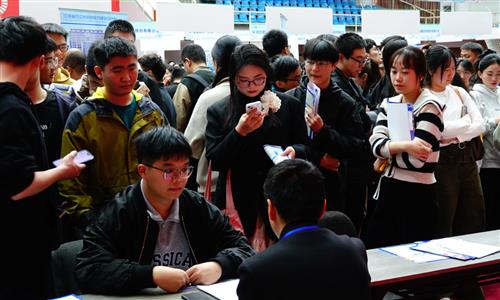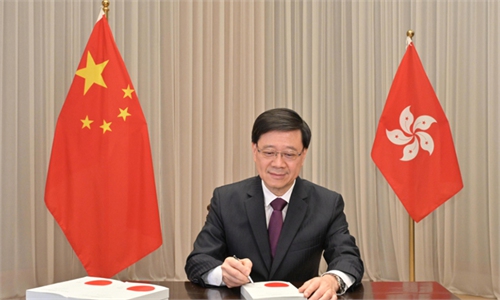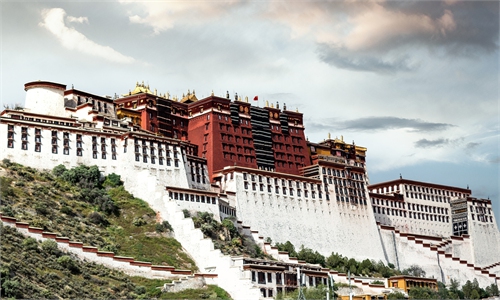Residents across Xizang region celebrate 65th anniversary of democratic reform
Successful practice of Chinese modernization in Xizang a potent rebuttal to smears of anti-China forces: expert
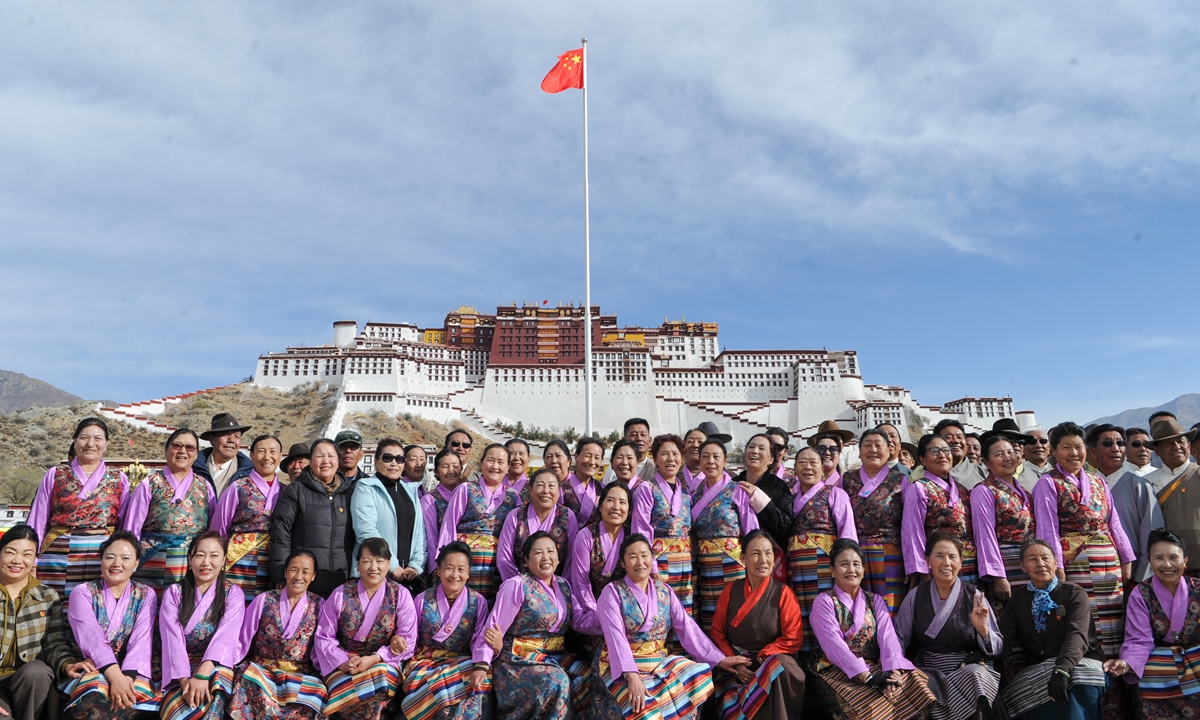
People pose for a group photo after a flag-raising ceremony to celebrate the Serfs' Emancipation Day at the square in front of the Potala Palace in Lhasa, capital of Southwest China's Xizang Autonomous Region, on March 28, 2024. Photo: cnsphoto
Engaging in flag-raising ceremonies, jubilant songs and dances to express their contentment, and hosting seminars to reflect on social progress … The residents of Southwest China's Xizang Autonomous Region celebrated on Thursday the 65th anniversary of the democratic reform, which marked the end of feudal serfdom, with a diverse array of activities. The smiles adorning local residents' faces not only attest to the region's remarkable growth over the past 65 years but also underscore the region's promising future, analysts said.
Xizang will continue to develop, contributing to China's modernization, which would be the most potent rebuttal to the falsehoods propagated by certain overseas anti-China forces seeking to tarnish the region's human rights record, observers said.
At 10:00 am on Thursday morning, with the melody of the "March of the Volunteers," China's national anthem echoing, residents of different ethnic backgrounds gathered at the square of the Potala Palace to witness the raising of the Five-Star Red Flag - China's national flag - and sang the national anthem to commemorate the 65th anniversary of the region's democratic reform.
Similar scenes unfolded throughout the region. While the Xizang region boasts extensive borders intertwined with the Himalayas, residents in the remotest border areas, once hard to reach, also celebrated the 65th anniversary of the democratic reform as well as their happy life.
In Yadong county, located in the southern borderlands of Xigaze city and intersecting with India and Bhutan, eight celebration events were held across its townships from Tuesday to Thursday. Apart from flag-raising, singing the national anthem, and watching the March 28 speech broadcast live, residents also commemorated and celebrated this day through quizzes, sports competitions, and cultural performances.
Puqiong, a 61-year-old resident in Yadong, said at the celebration, "Today is a day worth commemorating. For me, our family has witnessed earthshaking changes in Xizang since 1959. The lives of Yadong's farmers and herders have greatly improved in aspects such as quality of life, transportation, and education."
"People here will continue to be grateful to the Party, serving as the guardians and builders of the border regions. Everyone is confident in the road to prosperity and will remain resolute in following the Party," he noted.
On this special day, border soldiers also celebrated with the local residents. Soldiers in the Xigaze Military Area joined the local flag-raising ceremony on Thursday morning and watched the public's celebratory performances. They also reviewed knowledge and history of the country and Xizang.
"Today marks the 65th anniversary of the liberation of 1 million serfs in Xizang. The people of all ethnicities in Xizang, brave and tenacious, have transformed the old, impoverished Xizang into a new Xizang with a prosperous economy, comprehensive social progress, a favorable ecological environment, and happy lives," Wang Qian from the Military Sub-district of the Xizang Military Command, told the Global Times on Tuesday.
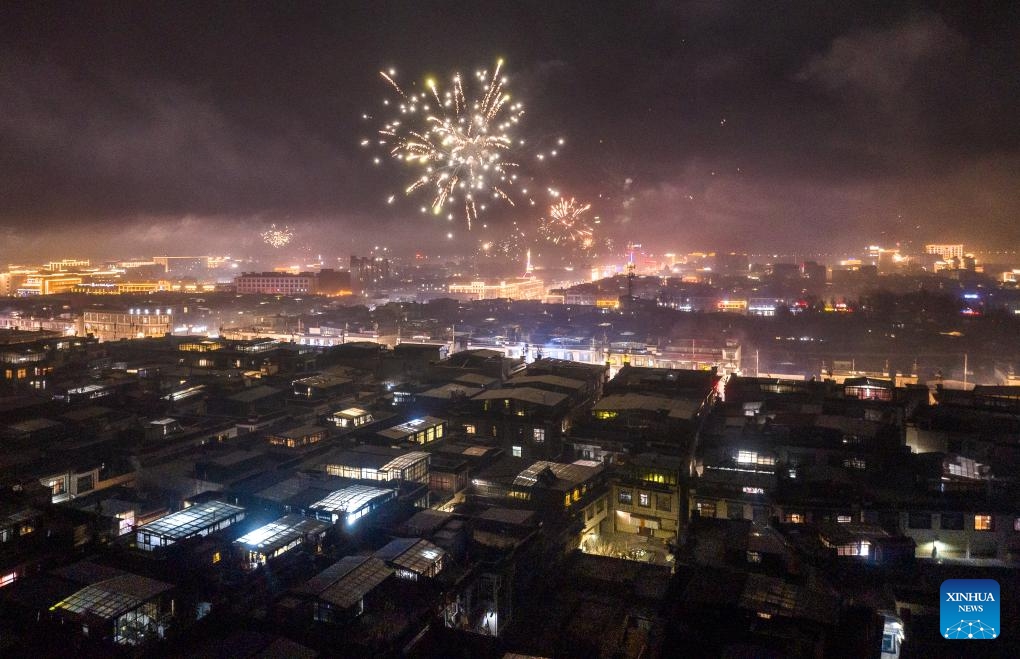
An aerial drone photo taken on Jan. 10, 2024 shows fireworks illuminating the sky on the "Gutu Eve" of farmers' New Year in Xigaze, southwest China's Xizang Autonomous Region. Photo: Xinhua
Full confidenceThe 1959 democratic reform in Xizang freed 1 million serfs, greatly liberated productivity and paved the way for the region's rapid development in economy, society and culture. Such a monumental historical event propelled progress in human rights protection in Xizang and it also stands as a landmark event in the advancement of global human rights, analysts said.
Over the past 65 years, under the strong leadership of the Communist Party of China (CPC), the people of all ethnic groups in Xizang have united and created a miracle of thousands of years in just a few decades, Yan Jinhai, deputy secretary of the Communist Party of China Xizang Autonomous Regional Committee and chairman of the People's Government of Xizang Autonomous Region, said in his speech published on the Xizang Daily newspaper on March 28.
Remarkable achievements have been made in various fields in Xizang. Yan noted that a total of 172 international and domestic air routes have linked Xizang with 74 cities across the world, and the total length of highways in the region has exceeded 120,000 kilometers. Notably, the growth rate of per capita disposable income of residents in Xizang has ranked first nationwide for nine consecutive years.
A new socialist Xizang with social stability, ethnic unity, religious harmony, economic prosperity, improved people's livelihoods, sound ecology and consolidated borders is standing high on the "roof of the world," said Yan.
The democratic reform in Xizang is fundamentally linked to the progress of human development and it embodies the civilized views, justice, morals, and values upheld by any nation striving for common human development and progress, Chen Zongrong, deputy director-general of China Tibetology Research Center (CTRC), told the Global Times on Thursday.
On Thursday, Chen and more than 80 scholars from China, Australia and Germany attended a seminar commemorating the 65th anniversary of the democratic reform of the Xizang region, reviewing the significance of the landmarking event and discussed the region's practices of Chinese modernization.
Gentsu Gyatso, an artist who lives in Australia, said the first half of lives of the majority of people in his grandmother's generation bore the fate of oppression and exploitation until when the democratic reform changed their lives.
Commemorating the democratic reform in Xizang requires viewing this great practice of human liberation and development from the perspective of the vast laboring people worldwide. It stands as a magnificent achievement on the path of human liberation and progress, said Gentsu Gyatso.
History has shown that without democratic reform, Xizang could not have achieved the tremendous progress it enjoys today. However, the Dalai clique, together with some anti-China forces, turns a blind eye and a deaf ear to the region's economic, social and human rights development, said Chen.
Aside from maliciously attacking the democratic reform, whitewashing the cruel, dark, barbaric, backward and authoritarian old Xizang as a paradise on earth, overseas anti-China forces have fabricated and hyped new lies, including forced assimilation in boarding schools, to slander the human rights situation in Xizang, analysts said.
Chen said that in fact, the Dalai clique and anti-China forces are not genuinely concerned about issues concerning ethnic groups in China, let alone the survival and development of all residents in Xizang. They exploit ethnic and religious topics to sow discord among the people, tarnish China's international image, and cause trouble to contain China's development, he noted.
Our annual commemorative activities of the democratic reform are also aimed at presenting the truth to the world and showing our full confidence in promoting long-term stability and high-quality development in Xizang through the comprehensive advancement of Chinese modernization, said Chen.



